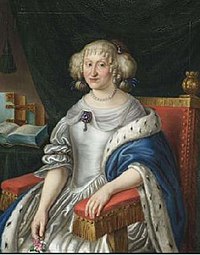Elisabeth Sophie of Saxe-Altenburg
| Elisabeth Sophie of Saxe-Altenburg | |
|---|---|
| Duchess of Saxe-Gotha and Altenburg | |
 |
|
| Tenure | 1640–1675 |
| Born |
10 October 1619 Halle |
| Died | 20 December 1680 (aged 61) Gotha |
| Spouse | Ernst I, Duke of Saxe-Gotha |
| Issue |
Elisabeth Dorothea, Landgravine of Hesse-Darmstadt Frederick I, Duke of Saxe-Gotha-Altenburg Albert, Duke of Saxe-Coburg Bernhard I, Duke of Saxe-Meiningen Henry, Duke of Saxe-Römhild Christian, Duke of Saxe-Eisenberg Princess Dorothea Maria Ernest, Duke of Saxe-Hildburghausen Johann Ernest, Duke of Saxe-Coburg-Saalfeld |
| House | House of Wettin |
| Father | Johann Philipp, Duke of Saxe-Altenburg |
| Mother | Elisabeth of Brunswick-Wolfenbüttel |
| Religion | Lutheranism |
Elisabeth Sophie of Saxe-Altenburg (Halle, 10 October 1619 – Gotha, 20 December 1680), was a princess of Saxe-Altenburg and, by marriage, duchess of Saxe-Gotha.
She was the only daughter of Johann Philipp, Duke of Saxe-Altenburg and Elisabeth of Brunswick-Wolfenbüttel.
In Altenburg on 24 October 1636, Elizabeth Sophie married her kinsman Ernst I, Duke of Saxe-Gotha. As a dowry, she received 20,000 guilders, who were pledged by the town of Roßla. As Widow's seat, the bride obtained the towns of Kapellendorf and Berka, with the called Gartenhaus in Weimar.
Because according to the succession laws of the House of Saxe-Altenburg (which excluded the women from inheritance), after her father died two years later (1 April 1639), he was succeeded by his brother, Frederick Wilhelm II.
When her cousin, the duke Frederick Wilhelm III died childless in 1672, Elisabeth Sophie became in the general heiress of all the branch of Saxe-Altenburg on the basis of her father's testament (as it was ultimately recognized in law that the Salic Law does not prevent an agnate from willing all his possessions to those other agnates of the house he desires to make his heirs, leaving other agnates without; and if those favored agnates also happened to be the testator's son-in-law and maternal grandsons, that's in no way prohibited).
Ernest I of Saxe-Gotha claimed the whole succession of Saxe-Altenburg, claimed both being the closest male relative and his wife's rights. However, the other branch of the family, the Dukes of Saxe-Weimar didn't accept that will, opening a succession dispute.
...
Wikipedia
